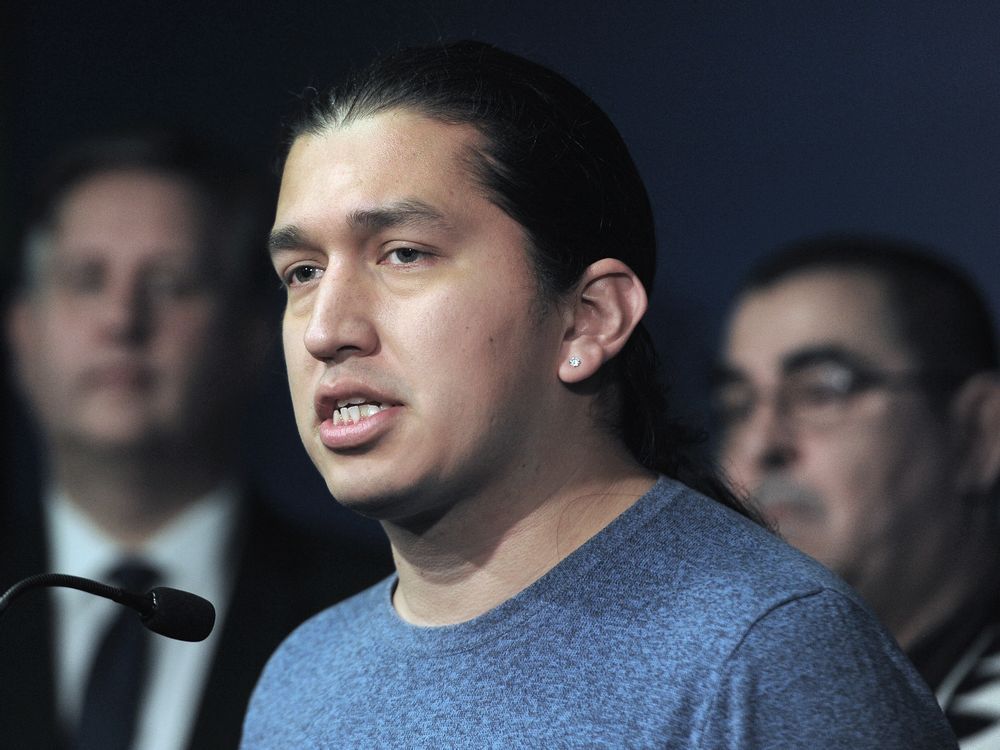Dan Fumano: First Nations, city, UBC pushing to go farther, together

Credit to Author: Dan Fumano| Date: Thu, 30 Jan 2020 02:42:09 +0000
The group gathered at Vancouver City Hall on Wednesday called to mind an over-used saying, of debatable origin: If you want to go fast, go alone; and if you want to go far, go together.
Five leaders had decided they wanted to go farther than previously planned — all the way to the Metro region’s western edge — and that they will have a better chance if they go together.
Vancouver Mayor Kennedy Stewart has been calling for the federal and provincial governments to support extending the Broadway Subway all the way to University of B.C. since before his election in 2018. And, with Wednesday’s announcement that UBC and, especially, the Musqueam, Squamish and Tsleil-Waututh First Nations are firmly and formally on board with that effort, that pitch might be harder for Victoria and Ottawa to ignore.
The Broadway Subway, as currently planned and funded, is a $2.83-billion, 5.7-kilometre extension of the Millennium SkyTrain line from VCC-Clark west to Arbutus Street.
Extending the line further west to UBC would benefit many Vancouverites, as well as the MST Development Corp. — the joint partnership of local First Nations who are developing a massive property near the proposed SkyTrain extension — and the academic institution which has also evolved into a multi-billion dollar real estate developer in its own right.
But the leaders gathered Wednesday stressed the regional importance of the proposed extension, to connect B.C.’s first, second, and third largest employment centres with its major airport and other suburbs, to help alleviate congestion, reduce carbon emissions, and improve productivity and quality of life.
It’s an expensive proposition. A preliminary estimate from TransLink said SkyTrain extension from Arbutus to UBC could cost as much as $4.8 billion.
The parties represented on the stage Wednesday expressed — in very vague terms — their willingness to discuss how they could contribute to making it happen.
Part of a memorandum of understanding struck late last year by UBC, Vancouver and MST involves “different funding possibilities, contributions,” Stewart said, and UBC president Santa Ono said the university is open to such discussions.
But the project’s success ultimately depends on senior governments, as Stewart often says.
The new memorandum formalizes the support of heavyweight allies in his efforts to get Ottawa and Victoria on board.
The local First Nations have become major real estate players, developing projectsindividually and jointly through MST Development. Even among the titans of Vancouver real estate, not many developers can boast a portfolio like MST, which oversees six properties totalling 65 hectares of prime developable Metro Vancouver land, valued, conservatively, at more than $1 billion.
No decisions have yet been made about locations of stations along the proposed line. But it stands to reason that MST Development would be interested in the idea of a station, or even two, to serve the Jericho Lands, the 36-hectare future community being planned west of Alma and north of Broadway.
“Yes, the nations have interests and we’re advancing them,” said Khelsilem, an elected Squamish council member, appearing alongside two MST colleagues, elected Musqueam Chief Wayne Sparrow, and elected Tsleil-Waututh Chief Leah George-Wilson.
“But those interests also overlap with our neighbours,” Khelsilem said, citing the example of addressing the climate crisis.
“The city and UBC benefits from the nations actually being involved, because the nations sometimes have access that UBC or the city might not, and vice versa,” he said.
Of course, the obligations and optics are different for senior governments dealing with a private real estate development firm, compared with the local First Nations who have called the land home for thousands of years. Horgan and Trudeau have both emphasized their commitment to reconciliation with Indigenous peoples, and that subject was repeatedly addressed by every speaker Wednesday.
The memorandum announced Wednesday was described as “historic,” and Khelsilem said he was not aware of any Canadian city that had struck a similar agreement with First Nations to advance such a major transit project. It presents, he said, “an opportunity for the federal and provincial governments to show their support for these types of relationships advancing.”
Stewart, who speaks warmly of his working relationships with Trudeau and Horgan, called them out by name Wednesday, saying: “People in this region need a commitment soon from Prime Minister Trudeau and Premier Horgan. … Those two gentlemen will make the decision of whether or not this SkyTrain will proceed.”
Time is of the essence, Stewart said, with projects in Toronto and Montreal competing for federal dollars.
“We’ve laid some early track on what this might look like,” Stewart said, but without the prime minister and premier on board, “these conversations don’t matter.”
“That’s really where the ball is now, it’s over in their courts. I don’t know if that’s a good analogy, because you’re playing two people,” Stewart joked, to a few laughs.
“But, I guess, there’s five of us,” the mayor continued, indicating his four companions sharing the stage with him. “So that’s good.”
Indeed.